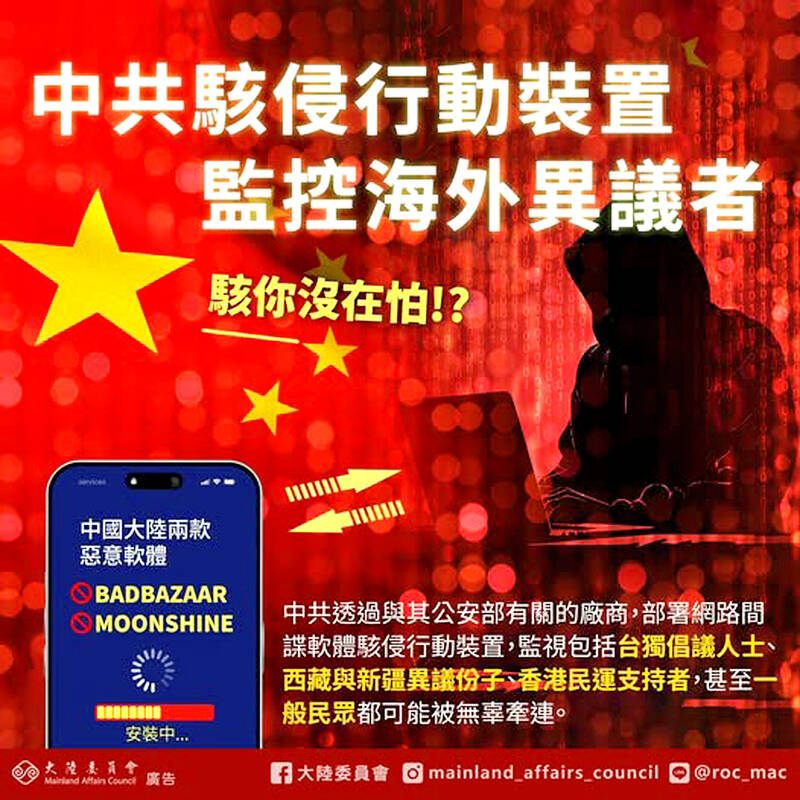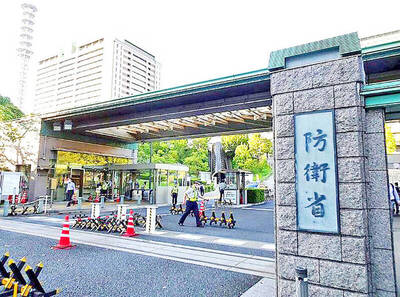China is conducting a large-scale cyberattack against Taiwanese in collaboration with state-owned software developers and hacker groups, the Mainland Affairs Council (MAC) said yesterday.
“Badbazaar” and “Moonshine” spyware are targeting devices possessed by Taiwanese, Hong Kongers, Uighurs, Tibetans, democracy advocates and ordinary people, the council said, citing a report by the British National Cyber Security Centre.
The report, published in collaboration with the cybersecurity agencies of the UK, the US and Germany, said that the spyware programs pose a “growing threat” to public security, as they were designed to give hackers access to geolocation data, cameras and microphones of infected devices.

Photo: screen grab from the Mainland Affairs Council’s Facebook page
Hackers are spreading the spyware under the guise of popular applications such as the messaging programs Line and Tibet One, the MAC said.
It urged people to only download apps from legitimate app stores, check the authorization settings of apps on their devices, report any suspicious messages and programs, and refrain from clicking on links leading to unknown Web sites.
The government last month published a national information security strategy and national security development plan for 2025 to 2028 to bolster Taiwan’s cybersecurity governance and defense, the council said.
Separately, the Straits Exchange Foundation published this year’s edition of the China Travel Safety Handbook, which includes a list of warnings for Taiwanese visiting China, Hong Kong or Macau.
Taiwanese travelers should back up and delete personal data from cellphones, tablets, laptops and other digital devices that could be searched or confiscated by Chinese officials before entering the country, it said.
Those visiting China should not bring political, historical or religious literature, take photographs of harbors, airports or military activity, discuss sensitive topics or affairs with others, or collect data on China’s economy or society without authorization, it said.
They should also avoid using or downloading Chinese apps, it said.
Some Taiwanese who did not follow the recommendations in the handbook have been detained, interrogated or imprisoned in China, it said.
Chinese officials arrested and charged a Taiwanese national involved in religion for allegedly breaching China’s laws against undermining law and order, it said, adding that the person remains imprisoned.
Taiwanese wishing to return to Taiwan the remains of a compatriot or loved one who died in China must present a death certificate issued by Chinese authorities at customs, it said.
Cremated remains require a cremation certificate, while a body in a coffin requires a disease prevention certificate, it said.
The certification can be handled by the person bringing the remains into the country or a customs broker, it said.
Government personnel and private citizens involved in sensitive matters must obtain prior permission before traveling to or transiting in China, it said.
Beijing’s promulgation last year of “22 articles” against Taiwanese independence advocates and supporters poses an “extremely high risk” to people visiting China, MAC Minister Chiu Chui-cheng (邱垂正) has said.
In response, Taiwan raised its travel advisory for China to “orange,” meaning all nonessential travel should be avoided, he said.

LOOKING NORTH: The base would enhance the military’s awareness of activities in the Bashi Channel, which China Coast Guard ships have been frequenting, an expert said The Philippine Navy on Thursday last week inaugurated a forward operating base in the country’s northern most province of Batanes, which at 185km from Taiwan would be strategically important in a military conflict in the Taiwan Strait. The Philippine Daily Inquirer quoted Northern Luzon Command Commander Lieutenant General Fernyl Buca as saying that the base in Mahatao would bolster the country’s northern defenses and response capabilities. The base is also a response to the “irregular presence this month of armed” of China Coast Guard vessels frequenting the Bashi Channel in the Luzon Strait just south of Taiwan, the paper reported, citing a

A total lunar eclipse, an astronomical event often referred to as a “blood moon,” would be visible to sky watchers in Taiwan starting just before midnight on Sunday night, the Taipei Astronomical Museum said. The phenomenon is also called “blood moon” due to the reddish-orange hue it takes on as the Earth passes directly between the sun and the moon, completely blocking direct sunlight from reaching the lunar surface. The only light is refracted by the Earth’s atmosphere, and its red wavelengths are bent toward the moon, illuminating it in a dramatic crimson light. Describing the event as the most important astronomical phenomenon

ENHANCING DETERRENCE: Stationing the missiles in Kyushu would allow Japan to cover waters near Taiwan and China’s coastal areas without any logistical difficulties Japan is to deploy extended-range anti-ship missiles at a Ground Self-Defense Force base in Kumamoto to bolster its defenses, the Yomiuri Shimbun reported on Saturday. The upgraded Type 12 surface-to-ship missile, with a range of more than 1,000km, would be capable of striking targets in the Taiwan Strait and along China’s coast. Originally limited to a few hundred kilometers, the Type 12 was recently modernized ahead of schedule. Deployment, initially slated for next year, has been accelerated after the upgrade was completed sooner than expected, the newspaper said. Stationing the missiles in Kyushu would allow Japan to cover waters near Taiwan and

The presence of Taiwanese politicians at China’s military parade tomorrow would send the wrong message to Beijing and the international community about Taiwan’s sovereignty and democracy, a national security official said yesterday. China is to hold the parade tomorrow to mark the 80th anniversary of Japan’s surrender in World War II. By bringing together leaders of “anti-West” governments such as Russia, North Korea, Iran and Belarus, the parade aims to project a symbolic image of an alliance that is cohesive and unbending against Western countries, the national security official said, speaking on condition of anonymity. Former Chinese Nationalist Party (KMT) chairwoman Hung Hsiu-chu